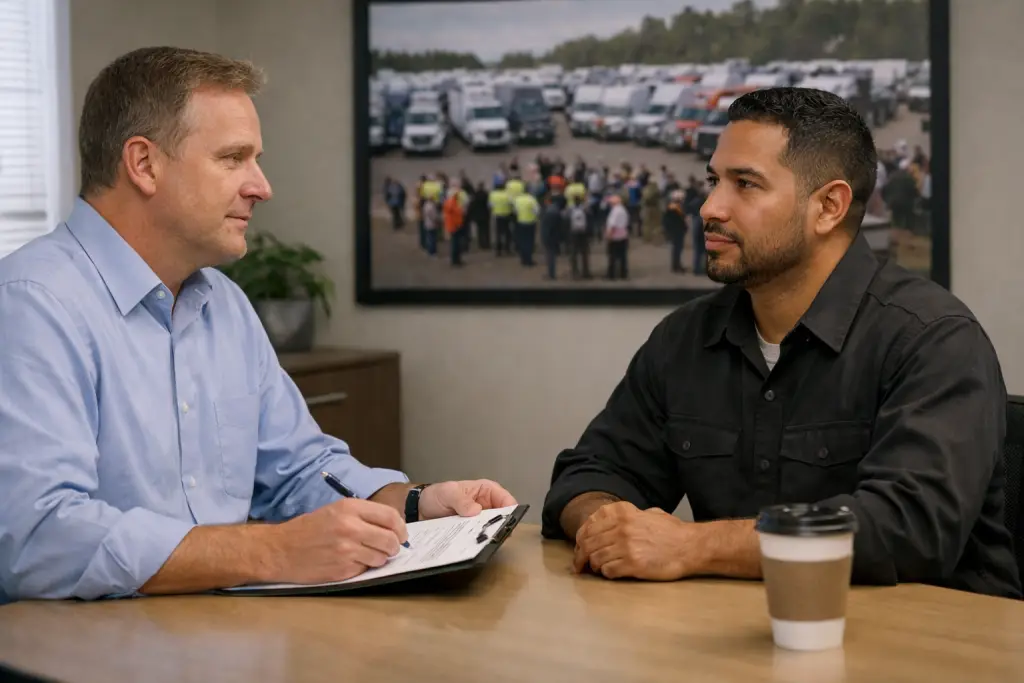Background checks are a critical element of the hiring process, particularly for staffing agencies tasked with sourcing top talent across diverse sectors. Did you know that companies that fail to conduct thorough background checks are five times more likely to hire someone with a criminal record that impacts their organization negatively? This statistic underscores the importance of background screening in safeguarding the reputation and integrity of your clients. In this article, we'll explore the specific background checks staffing agencies need to become adept at performing to meet the unique requirements of 12 major industries.
Key Takeaways
- Different industries face unique challenges in conducting effective background checks, which are critical to ensuring safety and compliance in hiring.
- In healthcare, strict checks such as verifying credentials and assessing criminal records are necessary to protect patient well-being and comply with regulations like HIPAA.
- The education sector prioritizes safeguarding students, requiring comprehensive checks for past misconduct and qualification verification.
- Finance professionals need thorough scrutiny of financial and criminal histories to prevent any potential misconduct that could harm a company’s reputation or finances.
- Transportation demands rigorous checks on driving histories and drug screenings to maintain the highest safety standards for both goods and passengers.
- For IT roles, assessing technical skills and ensuring data handling integrity is essential, with background checks focusing on employment verification and criminal record checks.
Industry-Specific Challenges in Background Checks
Each industry has its own hurdles when it comes to background checks. Understanding these distinct challenges can make the difference between a smooth hiring process and a potential disaster.
- The healthcare sector requires stringent checks to ensure patient safety and compliance with laws like HIPAA. Verifying credentials and checking for OIG exclusions are just the beginning. The risk of hiring someone with a problematic history in healthcare is too great to ignore.
- In education, protecting students is non-negotiable. Child abuse registry checks are mandatory, as are thorough reviews of past employment in educational settings. Missing out on any part of these checks can expose institutions to immense legal and reputational risks.
- Finance professionals handle sensitive financial data, so background checks focus on credit and financial histories, alongside criminal records. Even a single lapse here can lead to grave financial misconduct.
- For IT, the emphasis is on technical skills and data handling integrity. It's not enough to assume past experience equals competency. Technical assessments can reveal more about a candidate's suitability than a simple resume can.
- Transportation workers, especially drivers, must comply with safety regulations. Repeated checks on driving records and ensuring drug-free workplaces are essential steps in this field.
- Retail is no stranger to high turnover, demanding quick yet effective screenings. Criminal checks and employment verifications are crucial, but reference checks shouldn’t be skipped even for lower-level roles.
- Manufacturing requires workers who not only understand safety protocols but also have a proven track record of reliability. Neglecting skills verification could lead to workplace accidents.
- Construction balances skill with safety. Proper licensing and a history of compliance with safety standards are mandatory. Ignoring past violations can result in costly and dangerous workplace incidents.
- Hospitality demands a keen focus on customer service skills. Verifying past employment thoroughly can prevent hiring individuals who may not be suited for client-facing roles.
- Government positions require some of the most detailed background checks, including federal employment history and security clearances. Partnering with agencies that understand these requirements is essential.
- Telecommunications workers need to be up-to-date on technological advancements. Regular re-evaluation of technical skills ensures that employees remain proficient as new technologies emerge.
- Agriculture often involves seasonal and temporary work. Ensuring workers are not only skilled but also properly verified prevents issues related to safety and compliance with state laws.
Understanding these industry-specific challenges and aligning your screening process accordingly leads to better hiring decisions. How does your current process measure up to these standards? Are there areas where you could improve or enhance your background check strategy?
EXPERT INSIGHT: Years ago, when I was a fresh graduate applying for a job, I thought that a background check was just a formal step. Fast forward to today, as one of the HR process owners of background checks, I know in my heart that this is not just a procedural step but a promise—to our organizations, our clients, and the people we place. It is a way to show that we value our people, just as we value integrity, safety, and honesty. In the field of recruitment, we’re not just finding the right person for the right position; we’re shaping the future of work by responsibly executing programs that align with the culture of the company we aim to cultivate. - Charm Paz, CHRP
Industry Breakdown: Tailoring Background Checks to Specific Needs
Each industry has its quirks. Knowing them is half the battle.
You must understand what makes an industry tick to perform background checks that truly matter. Let’s dive into what you need to know.
1. Healthcare
In the healthcare industry, patient safety and regulatory compliance take center stage. You're tasked with ensuring that candidates meet stringent qualifications and uphold trustworthiness.
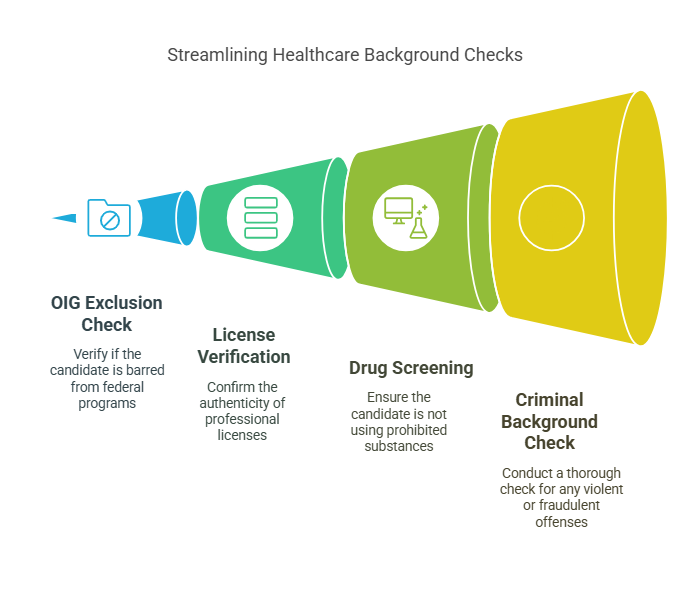
- Key Background Checks: The OIG exclusion list should be your first stop. This list identifies individuals barred from participating in federal healthcare programs due to fraud or misconduct. Missing this step can land your client in hot water. Next, verify licenses. A suspended or fraudulent license can't slip through. Cross-check details with state boards to confirm authenticity. Drug screenings are non-negotiable. The last thing you want is a healthcare worker under the influence, jeopardizing patient care. Conduct thorough criminal background checks. Focus on any violent or fraudulent offenses, as these raise red flags in patient care environments.
- Legal Considerations: HIPAA demands rigorous protection of patient data. Know the state-specific licensing laws since each state has its own regulations.
- Best Practices: Partnering with a provider specializing in healthcare checks is wise. They'll have access to relevant databases and understand the nuanced legal landscape.
- Potential Pitfalls: Avoid incomplete database checks. A superficial glance at records can lead to dire oversights. Ensure processes are consistent across all checks to maintain quality and reliability.
Would you trust a healthcare worker without a comprehensive background screening? Your role is pivotal in upholding the standards and reputation of your clients.
2. Education
Educators play a critical role in shaping young minds, making background checks in this sector non-negotiable. Ensuring the safety and integrity of the learning environment is paramount.
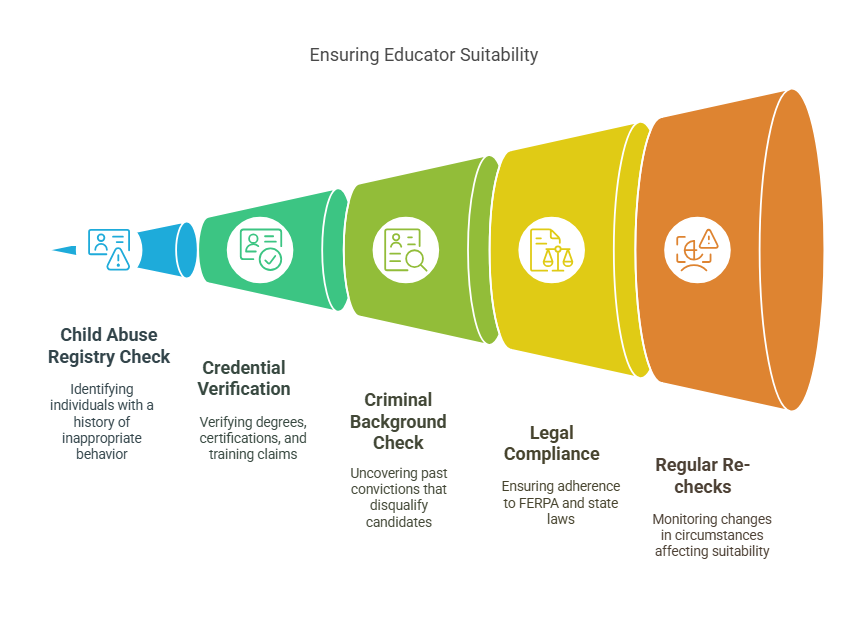
- Key Background Checks: Checking against the child abuse registry is a fundamental step. This check aims to identify individuals who have been flagged for inappropriate behavior with minors. Confirming the qualifications and credentials of educators is non-negotiable. This involves verifying degrees, certifications, and any additional training they claim. Fake credentials can jeopardize the quality of education and the institution's reputation. A thorough criminal background check is necessary to uncover any past convictions that may disqualify a candidate from working with children. School districts often have state-specific requirements, adding an additional layer of due diligence.
- Legal Considerations: Agencies need to be aware of the Family Educational Rights and Privacy Act (FERPA). This federal law protects the privacy of student education records, guiding what can be disclosed during the hiring process. Complying with state-specific educational laws ensures screenings meet legal standards and expectations.
- Best Practices: Regular re-checks can identify changes in circumstances that might affect an educator's suitability. Faculty involved in extracurricular activities or those with access to dormitories or sensitive areas should be frequently monitored.
- Potential Pitfalls: Neglecting an educator's thorough history can be detrimental. Overlooking online educational programs or non-traditional certifications can also lead to hiring less qualified candidates. Thoroughly verify reported qualifications to prevent fraud.
In the education sector, these checks act as a safeguard for students and reinforce the institution's commitment to providing a secure learning environment. Always ensure checks are precise, comprehensive, and aligned with the latest legal requirements to maintain trust in your staffing practices.
3. Finance
In finance, precision and trust are non-negotiable. You're dealing with people's money, and mistakes can be costly.
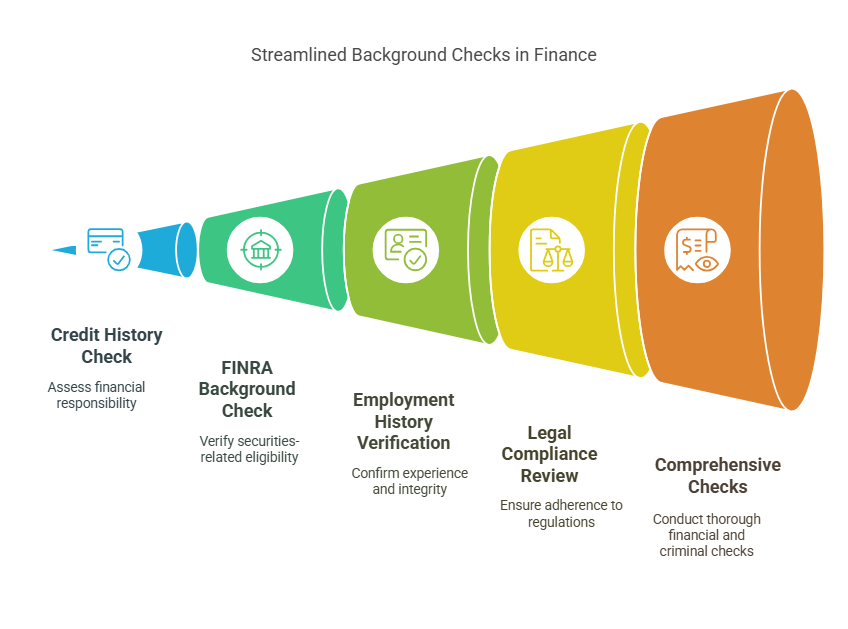
- Key Background Checks: Start with a credit history check. It indicates financial responsibility, crucial in finance roles where money handling and decision-making are integral. A FINRA background check is essential for roles involving securities. It ensures candidates meet the standards set by the Financial Industry Regulatory Authority. Employment history in finance is significant. Verify their track in previous positions to confirm experience and integrity.
- Legal Considerations: Follow the Fair Credit Reporting Act (FCRA) guidelines, which govern how companies can use consumer information. The Sarbanes-Oxley Act demands scrutiny of an employee's past conduct to avoid financial misrepresentation.
- Best Practices: Implement comprehensive financial and criminal checks. Cross-check references and ensure they align with the employment history. Collaborate with a screening provider experienced in finance. They can offer insights on nuances specific to financial regulations and practices.
- Potential Pitfalls: Avoid overlooking financial misconduct in past jobs. Recognize red flags early in the screening process, such as unexplained gaps in employment or discrepancies in credentials.
Remember, thoroughness pays off. Each check you perform protects your client from future complications in this sensitive industry.
4. Information Technology
IT demands professionals who are not only technically capable but also reliable in handling sensitive information. In this sector, thorough background checks help ensure both skills and integrity.
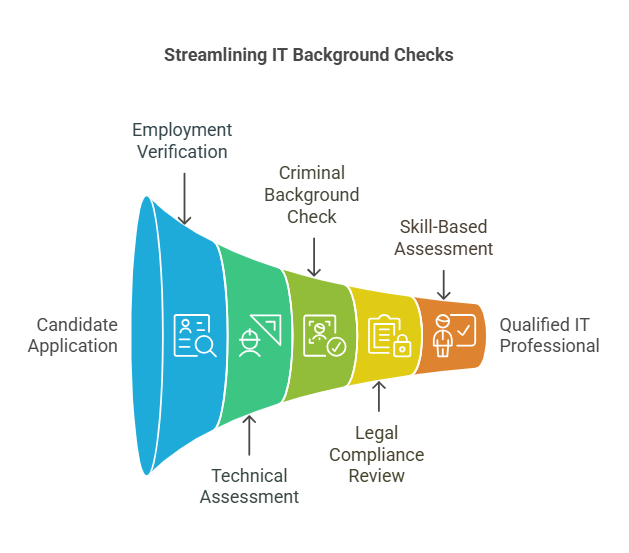
- Key Background Checks: Start with employment verification to confirm past job roles and responsibilities. Technical assessments are also essential to evaluate the candidate's skillset. Criminal background checks help identify any past infractions that might raise trust concerns.
- Legal Considerations: Data protection laws like GDPR play a crucial role. You need to ensure your background check processes comply with data privacy regulations specific to the tech industry. Familiarize yourself with both domestic and international requirements if you're operating globally.
- Best Practices: Incorporate skill-based assessments into your hiring process. Don't just rely on resumes or previous job titles to assume competency. Verify each candidate's technical abilities through testing or project reviews. This ensures they meet your client's specific needs.
- Potential Pitfalls: Avoid the assumption that previous employment at a well-known tech company guarantees expertise. Always verify claims rather than making assumptions. Failing to do so could result in hiring underqualified personnel, leading to operational disruptions and trust issues with clients.
5. Transportation
In the transportation industry, safety is paramount. Drivers are responsible for passengers, goods, and vehicles, so thorough background checks are essential.
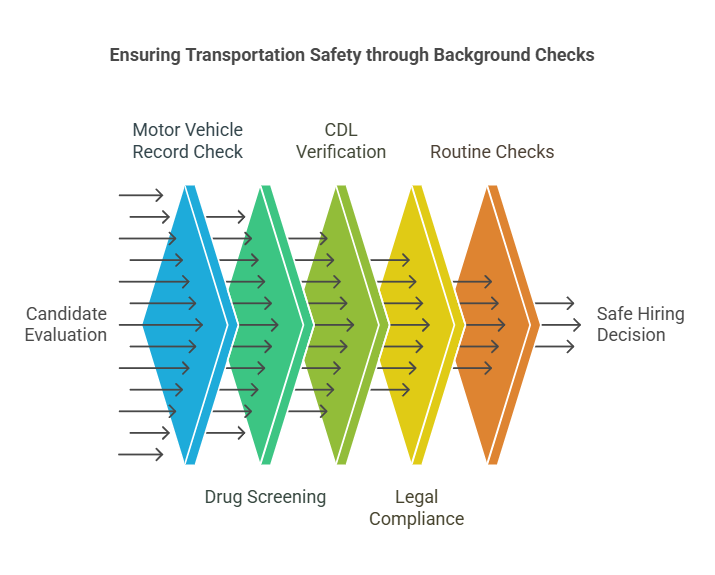
- Key Background Checks: Start with a Motor Vehicle Record (MVR) report. It provides insights into a candidate's driving history, revealing traffic violations, suspensions, and other incidents. A clean record shows responsibility behind the wheel. Drug screening is crucial. It ensures candidates aren't under the influence, safeguarding everyone on the road. The Department of Transportation (DOT) mandates these tests to uphold safety and reliability. Commercial Driver's License (CDL) verification is vital if job roles require it. Confirming a candidate's license status ensures they meet legal and professional criteria.
- Legal Considerations: Adhering to DOT regulations is non-negotiable. Regulations dictate safety standards and processes for background checks, particularly for roles involving commercial vehicles. Additionally, stay updated on specific state DOT compliance rules, as they can vary.
- Best Practices: Conduct routine checks on driver certifications. Regular updates prevent lapses in compliance and keep safety protocols in line with current standards.
- Potential Pitfalls: Skipping comprehensive checks on a driver's traffic history can lead to hiring someone with a problematic driving record. This oversight risks safety and exposes your organization to liability. Always prioritize detailed screenings to maintain high safety standards.
6. Retail
Retail environments are fast-paced, demanding efficient hiring processes due to high staff turnover. However, speed shouldn't compromise thoroughness.
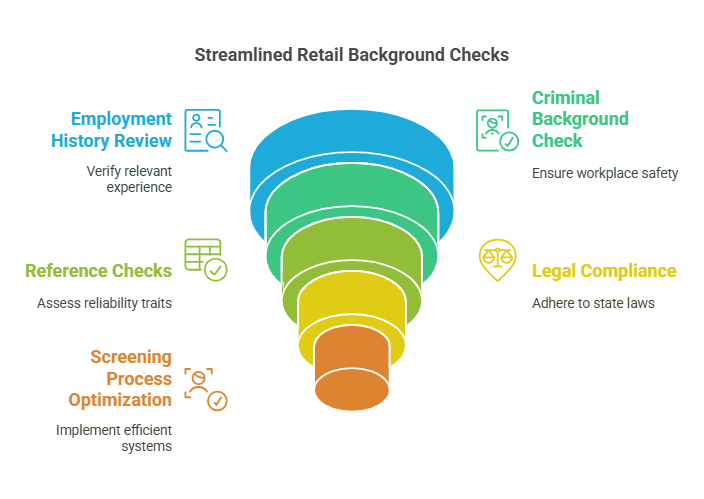
- Key Background Checks: Focus on employment history to ensure candidates have relevant experience. Conduct criminal checks to protect the workplace and customers. Don't skip reference checks, even for entry-level positions; they often reveal reliability traits that application forms miss.
- Legal Considerations: Be aware of varying state background check requirements. Each state might have laws affecting how far back you can search criminal records, or what information you can use in hiring decisions. Complying with labor laws is also crucial, especially when dealing with minors or part-time workers.
- Best Practices: Streamline your screening process without sacrificing quality. Implement systems that allow you to perform quick but comprehensive checks. Consider using technology that automates parts of the process, ensuring you keep up with the retail sector's dynamic nature.
- Potential Pitfalls: A common mistake is overlooking reference checks, particularly for lower-level roles. These roles often involve handling cash or sensitive customer information. Investing time in reference checks can prevent potential issues down the line, like theft or customer service mishaps. Are you confident in the reliability of the candidates you hire? Taking shortcuts in the screening process could expose your business to unnecessary risks.
7. Manufacturing
Manufacturing is a sector where safety and reliability are paramount. Skilled labor is a critical piece of the puzzle, and errors can lead to costly accidents or production delays.

- Key Background Checks: For staffing agencies, ensuring candidates meet the necessary requirements begins with a few essential checks. Employment verification is where you get a sense of the candidate's work history. Confirm past employment dates and roles to ensure you're placing someone with the right experience in operating machinery or understanding production processes. Drug screening is non-negotiable in manufacturing. Operating heavy machinery requires complete sobriety. Even a minor oversight can lead to serious injuries, affecting not just the individual but the entire operation. Checking OSHA records is another crucial step. Knowing a candidate’s history with Occupational Safety and Health Administration regulations will help you spot patterns of non-compliance or uncover a strong safety record.
- Legal Considerations: Legal considerations are straightforward but vital: OSHA compliance tops the list, and union regulations may come into play depending on the factory or company.
- Best Practices: Partnering with a screening firm that understands these nuances can help you avoid missing critical checks. These firms can perform in-depth screenings more efficiently and bring expertise to the table.
- Potential Pitfalls: Skipping skills verification is tempting when under pressure to fill positions quickly. But this gamble may lead to on-the-job accidents, which are entirely preventable with thorough checking.
As you continue to help clients in the manufacturing sector, always ask: Are we sure this candidate can handle the demands of the job safely? The answer may be clearer with comprehensive background checks.
8. Construction
Construction demands precise skills and strict adherence to safety standards. Failing to conduct thorough background checks can lead to legal issues and unsafe working conditions.
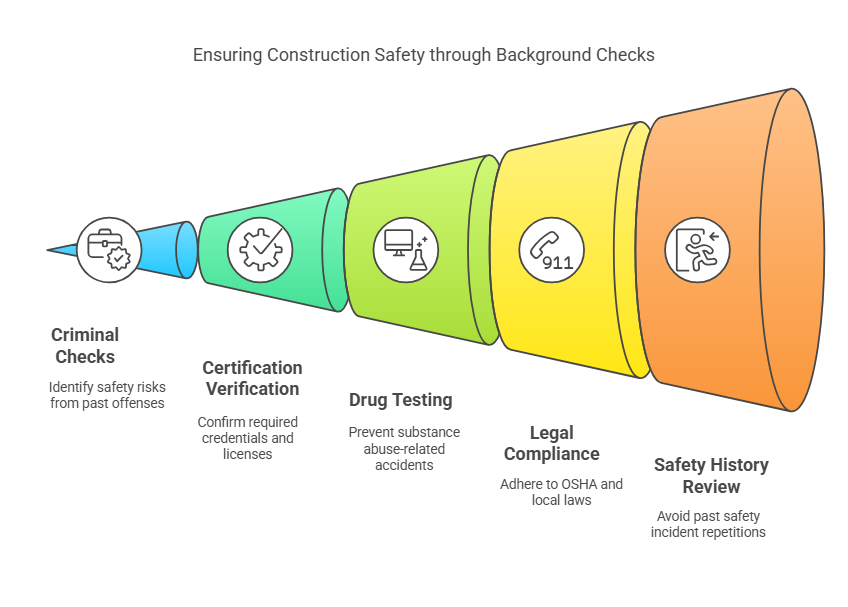
- Key Background Checks: Focus on criminal checks. They uncover past offenses that might pose safety risks on a job site. This includes violent crimes or theft, which are especially concerning in environments with heavy machinery and valuable equipment. Certifications and licenses are crucial. Ensure every worker has the required credentials. This verifies their ability to perform specific tasks safely and efficiently. Drug testing is non-negotiable. Substance abuse can lead directly to workplace accidents. Consistent testing helps maintain a safe and accountable work environment.
- Legal Considerations: Legal considerations can't be underestimated. Familiarize yourself with OSHA and local construction laws. They dictate necessary safety and health standards.
- Best Practices: Best practices include verifying all licenses. Cross-check against national and local registries. This avoids the risks of forgery or outdated qualifications.
- Potential Pitfalls: Potential pitfalls often revolve around safety violations. Ignoring a candidate's history with safety incidents risks repeating past mistakes. Keep comprehensive records and make safety history a top priority in the hiring process.
9. Hospitality
The hospitality industry is characterized by high turnover rates and a focus on delivering exceptional customer service. As a staffing agency, your role involves swiftly filling positions without compromising the quality of candidates.
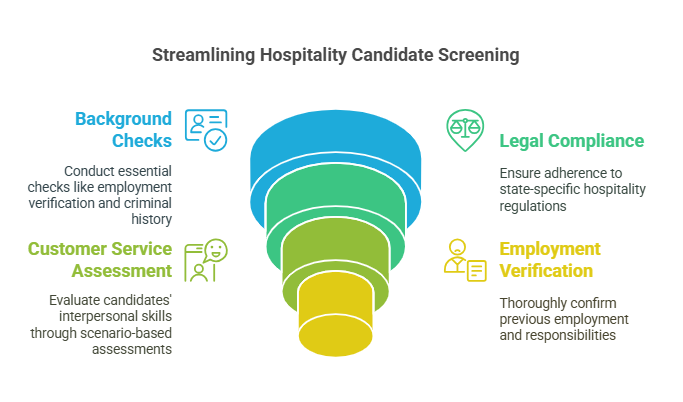
- Key Background Checks: Key background checks in hospitality include employment verification and criminal history checks. Ensuring that candidates have a clean record is essential to maintaining the safety and reputation of venues like hotels or restaurants. Employment verification can also confirm that a candidate has the necessary experience in guest services or management roles.
- Legal Considerations: Legal considerations often involve state-specific regulations. These can vary widely, so it's crucial to stay updated on local hospitality laws. Understanding these rules helps you avoid legal pitfalls and ensures your placements are compliant.
- Best Practices: To excel, incorporate customer service assessments in your screening process. These assessments offer insights into candidates’ interpersonal skills, which are crucial in customer-facing roles. Consider scenarios where potential hires may interact with guests, and plan evaluations around them.
- Potential Pitfalls: Potential pitfalls include not verifying employment history thoroughly. This can lead to misrepresentations that risk client satisfaction. Avoid over-reliance on candidates’ resumes; always confirm previous employment and responsibilities directly with past employers. This practice reassures your clients of the reliability and integrity of their new hires.
10. Government
Government positions require some of the most rigorous background checks. The stakes are high, involving national security and sensitive information. When you're engaging with government hiring, your first consideration is conducting comprehensive security clearances. These clearances ensure a candidate is trustworthy and free from any security risks.
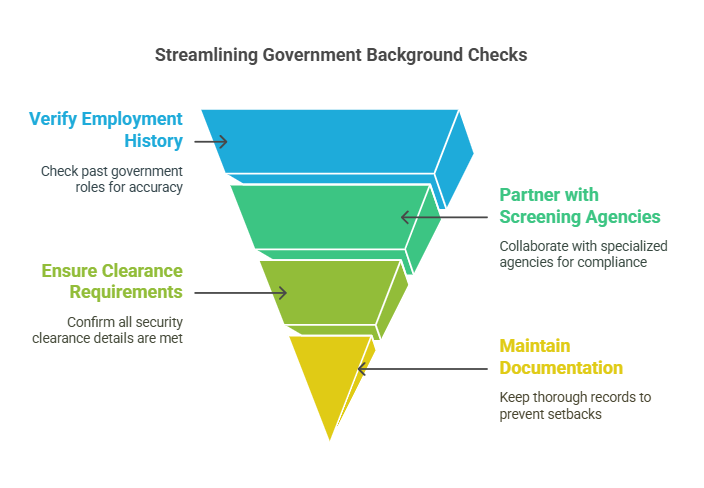
- Key Background Checks: Key checks include federal employment history and personal references. It's vital to verify past employment in government roles and ensure alignment with any required federal regulations. Familiarity with these rules can smooth out the vetting process and prevent future headaches.
- Best Practices: You'll need to partner with screening agencies equipped to handle government standards. Agencies that understand these specific requirements can save you time and ensure compliance with stringent guidelines.
- Potential Pitfalls: One common mistake is failing to meet clearance requirements. Missing even a minor detail could result in significant setbacks. Keeping meticulous records and thorough documentation can safeguard against such issues.
In the world of government screening, there's no room for error. Approach each check with the care it demands, and remember the importance of accuracy and reliability in this sector.
11. Telecommunications
The telecommunications industry demands employees who are not only technically skilled but also adaptable to its fast-paced environment. As an expert in background checks, you should know that this sector is constantly evolving, with new technologies and regulations reshaping its landscape.
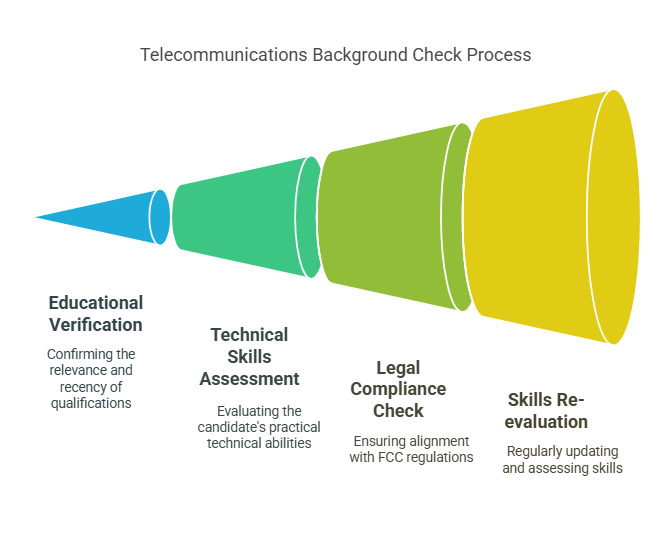
- Key Background Checks: For telecommunications roles, educational verification is foundational. Confirming the educational background can ensure the candidate has the requisite knowledge for the job. However, it's not just about holding a degree; it's about relevance and recentness of qualifications too. A technical skills test is critical, given the technical nature of the work. This helps ascertain if the candidate can apply their knowledge practically and handle the specific technologies prevalent in the industry.
- Legal Considerations: Legal considerations pivot around compliance with FCC regulations. Ensure your checks align with these federal guidelines to avoid any compliance issues for your clients.
- Best Practices: Frequent re-evaluation of technical skills is a best practice in this field. Technology in telecommunications advances at breakneck speed. Regularly reassess your candidates' capabilities to make sure they keep pace with industry changes. Are their certifications up to date? Have they engaged in recent training sessions?
- Potential Pitfalls: One major pitfall is ignoring these rapid technological advancements. Failing to verify continual learning and skill upgrades can leave companies vulnerable to operational inefficiencies.
Doing background checks in telecommunications involves more than ticking boxes. It's about offering a workforce that not only meets current demands but anticipates future needs. As such, your agency's effectiveness hinges on its ability to fine-tune checks to match this industry's unique pace and standards.
12. Agriculture
Seasonal work and diverse labor requirements make agriculture a unique industry for staffing. Background checks in this sector demand a focus on both flexibility and safety compliance.
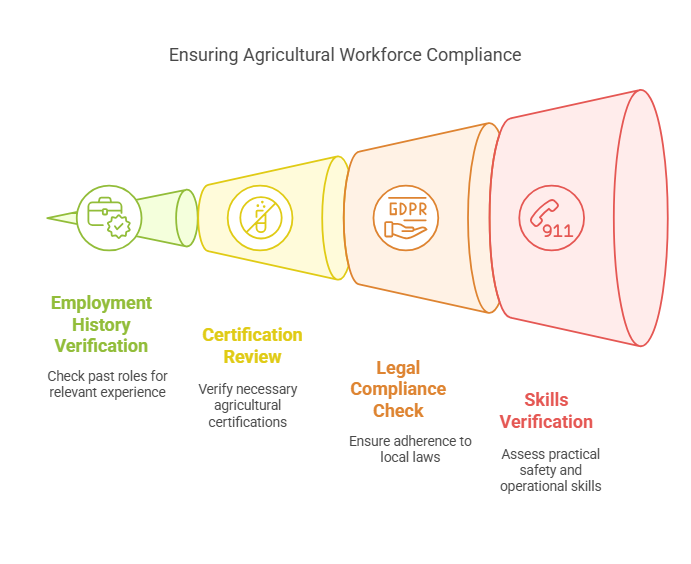
- Key Background Checks: When checking employment history, verifying past work in similar roles ensures candidates have the necessary experience dealing with tasks particular to farming, like crop handling or equipment operation. Agricultural certifications, such as pesticide application licenses, also need scrutiny. Confirming these credentials helps maintain compliance with safety and environmental standards.
- Legal Considerations: Understanding state-specific agricultural laws is crucial. Variability in regulations regarding migrant work, seasonal employment, and child labor can lead to compliance challenges. Being aware of these laws minimizes risks related to employing underqualified or unauthorized individuals.
- Best Practices: Your best practice here is comprehensive skills verification. Make sure to verify not only formal certifications but also practical skills related to safety and operational protocols. This approach reduces the risk of accidents and enhances productivity.
- Potential Pitfalls: Be cautious about the pitfalls of inadequate verification, especially with temporary workers. Rushed or incomplete checks can lead to unskilled labor on-site, endangering both workers and produce. A structured, reliable background check process, even for short-term roles, elevates the quality of the workforce and supports safe farming practices.
Beyond the 12: Mastering General Best Practices
General Best Practices
- Obtain Consent: Always secure written consent before diving into background checks. Consent lays the foundation for a transparent process. It reassures the candidate and protects your agency legally. Skipping this step can lead to legal headaches.
- Adverse Action Procedures: When a background check negatively impacts a hiring decision, you need to follow the right steps. First, provide the candidate with a pre-adverse action notice. Give them a chance to dispute or explain any findings. If the decision still stands, send a final adverse action notice. This not only complies with the Fair Credit Reporting Act but also maintains fairness.
- Data Privacy: Protecting candidate information is non-negotiable. Handle all data with the utmost care. Use secure systems and limit access to only those who need it. Data breaches not only damage reputation but can result in hefty penalties.
By integrating these practices, you mitigate risks and build trust with both candidates and clients. Maintaining a robust framework is your shield against potential pitfalls in the background check process.
Choosing a Background Check Provider
Finding the right background check provider is crucial for ensuring reliable and accurate results. With countless providers available, it’s important to select one that aligns with your specific needs.
- Compliance is Key: Ensure the provider complies with the Fair Credit Reporting Act (FCRA) and other relevant laws. Ask about their procedures for maintaining compliance. This protects you and your clients from potential legal issues.
- Industry Specialization: Some providers specialize in certain industries. If your agency serves a specific sector, consider a provider with expertise in that area. They will be familiar with the necessary checks for your industry and can offer critical insights.
- Technology Integration: Look for a provider that integrates well with your existing systems. Technology should streamline your operations, not complicate them. Providers with easy-to-use platforms can make the process more efficient and less time-consuming.
- Turnaround Time: Fast processing is often essential, especially for industries with high turnover rates. Ask potential providers about their turnaround times for different types of checks. Delays can impact your hiring decisions and client satisfaction.
- Client Support: Reliable customer support is a must. You might encounter issues or have questions, and having a responsive support team can make all the difference. Test their support responsiveness and expertise during your selection process.
- Data Security: Security of candidate data should be a top priority. Assess their data protection measures to ensure they meet industry standards. Breaches can lead to significant legal and reputational damage.
Choosing a provider is more than just a business decision—it’s about establishing a partnership. Make sure they are committed to adapting as your needs evolve and as industry standards change.
Technology and Automation
Using technology can transform your background check process. Leveraging AI and automation offers speed and precision that manual methods lack. Automate routine tasks like data entry and verification to save time.
- AI systems can analyze vast amounts of data more efficiently than humans. They identify patterns and flag potential issues quickly. For example, AI can scan social media profiles for red flags or inconsistencies.
- Automation helps ensure consistency across checks. It minimizes human error, which is crucial when handling sensitive information. Consistent procedures lead to more reliable and fair outcomes.
- Integrating technology also enhances candidate experience. Automated systems provide updates and a smoother process. Candidates can track the status of their checks, reducing anxiety.
- When choosing technology solutions, focus on compatibility with your current systems. This reduces setup time and ensures seamless data flow.
Does your current process meet efficiency standards, or could automation improve it? Embrace these tools to keep your agency competitive in handling complex background checks.
Future Trends
Background checks are evolving rapidly due to technological advancements. Here are some future-focused trends you should be prepared for:
- Continuous Screening: Companies are moving towards ongoing monitoring beyond pre-employment checks. Imagine a scenario where a candidate passes the initial screening but later engages in behavior that could affect their suitability for the role. Continuous screening aims to catch such changes promptly.
- AI-Powered Checks: Artificial Intelligence is increasingly being used to streamline background screening processes. AI can help in quickly analyzing large volumes of data with precision. It reduces the time and effort needed to identify red flags in a candidate's profile.
- Blockchain for Verification: Blockchain technology holds promise for more reliable storage and sharing of verified credentials. This could make verifying educational and professional histories more transparent and harder to falsify.
- Remote Work Implications: With the rise of remote work, there’s a shift in what’s prioritized during screenings. Verifying online conduct and cyber hygiene are becoming crucial, particularly for roles involving sensitive data or remote IT access.
Adaptation to these trends will be necessary. How prepared are you to integrate these technologies into your screening processes? Staying updated and open to innovation could provide a competitive edge in delivering more accurate and reliable candidate assessments.
Successful completion of background checks requires more than just a checklist. It demands an understanding of the nuances specific to each industry, ensuring that all regulations are adhered to and no detail is overlooked.
Closing
For staffing agencies, the goal is not merely to fill a position but to place candidates who seamlessly fit the role and industry requirements. This means going beyond the basics. Tailor your approach to meet client expectations and safeguard their interests.
Why is this level of attention necessary? First, it builds trust. Clients need to know that every candidate presented is thoroughly vetted. A reputation for thoroughness makes your agency the go-to service.
Next, consider risk mitigation. Every industry has unique risks. From healthcare to finance, failing to perform the right checks can lead to costly mistakes. For instance, a financial company could face severe penalties if a key player has a previously undiscovered history of fraud.
Does your background check provider specialize in the industries you serve? If not, it may be time to reconsider. Providers with a strong track record in your targeted sectors will better understand the compliance landscape. This partnership ensures you deliver on promises made to your clients.
Another factor is technology. Look for solutions that offer advanced tools capable of streamlining processes without sacrificing accuracy. This could include AI-based tools for faster verification or automated alerts for any discrepancies that require further investigation.
Finally, stay informed about future trends. The landscape of background checks is always evolving. Continuous updates on best practices and technologies will keep your agency one step ahead, maintaining a competitive edge.
Remember, meticulous background checks are not just a procedural necessity—they are a strategic advantage that sets leading staffing agencies apart.
Frequently Asked Questions
Which industries require specialized background checks for staffing agencies?
Healthcare often requires checks for professional licenses and malpractice history. Finance emphasizes criminal history and credit checks to ensure trustworthiness. Education involves verifying academic credentials and checking for any history of abuse or misconduct. In the technology sector, verifying technical certifications and employment history is often necessary.
How to customize background checks for healthcare temporary workers?
Verify all medical licenses and certifications to ensure validity. Check malpractice history for past lawsuits or complaints. Conduct employment verification to confirm past roles in healthcare. Implement routine drug screening for safety compliance.
Are construction industry background checks different from retail roles?
Construction background checks focus on verifying certifications for machinery operation and safety regulations, along with any past workplace safety violations. Retail checks emphasize customer service roles and look for any previous incidents of theft or fraud.
What red flags matter most in cybersecurity candidate screenings?
Ethics violations, such as unauthorized access to data, are a major concern. Missing essential certifications like CISSP may indicate a lack of expertise. Frequent job changes can be a sign of instability.
Do staffing agencies need to screen nonprofit volunteers differently?
Assess the motivation behind volunteering to ensure a genuine interest. Conduct thorough criminal background checks to protect vulnerable populations. Verify relevant skills or certifications for niche volunteer roles.
How to verify international certifications for tech placements?
Ensure the issuing organization is accredited and recognized. Determine if the certification aligns with domestic standards. Check language proficiency if applicable to the role.
What are important elements of reference checks for executive positions?
Inquire about past leadership experiences and management style. Explore examples of strategic decisions and their impact. Gather feedback on team dynamics and interpersonal skills.
How can you enhance the accuracy of criminal background checks?
Use multiple databases to ensure comprehensive coverage. Regularly update records to catch recent offenses. Verify the identity of candidates to prevent errors.
What should you consider when screening candidates for remote positions?
Look for signs of self-discipline and reliability. Evaluate communication skills, especially proficiency in digital tools. Ensure candidates have a functional remote workspace.
How can social media be used in the screening process?
Review professional presence for industry engagement and credibility. Assess cultural fit by analyzing interactions and shared values. Identify red flags such as inappropriate behavior or controversial opinions that could impact the company’s reputation.

GCheck Editorial Team
Meet the GCheck Editorial Team, your trusted source for insightful and up-to-date information in the world of employment background checks. Committed to delivering the latest trends, best practices, and industry insights, our team is dedicated to keeping you informed.
With a passion for ensuring accuracy, compliance, and efficiency in background screening, we are your go-to experts in the field. Stay tuned for our comprehensive articles, guides, and analysis, designed to empower businesses and individuals with the knowledge they need to make informed decisions.
At GCheck, we're here to guide you through the complexities of background checks, every step of the way.




